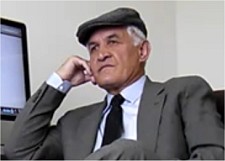Far from fearing him, the Kurdish people love him. His writings and his new ideas are giving Kurdish people, especially Kurdish women, hope for freedom from dictators and corrupt leaders imposed on them by western and eastern imperialists intent on accessing cheap oil and other raw materials from the Middle East and Asia. Ocalan's response to the Guardian editorial implies that some intellectuals in western countries are prepared to twist the truth to serve specific interests without regard for human rights.
Here it is in full:
On Thursday 5 December 2013, The Guardian published an editorial article on the occasion of Nelson Mandela's death. The article included a significant(!) comparison between Mandela and some other names like Jawaharlal Nehru, Aung Sang Suu Kyi, and me. As long as they approach the issue with a hegemon's mindset, the potentates will certainly continue to make such comparisons among those figures winning the affection of their peoples. However, any comparison has its own inner problems.
The time of the struggles, varying geographic and political conditions and even the characteristic differences between the figures will render such comparisons problematic. First of all, for me, being remembered together with a leader for whom all the world shed tears shows the extent to which our struggle line has taken universal dimensions. It also demonstrates the fact that our case couldn't be explained as a struggle only against an unjust treatment.
Writing on the capabilities of a leader with exemplary methods of struggle and negotiation just after his death needs some more pondering on the history and politics of risk-takers, in order to get a better understanding of the conditions of those who haven't been afraid of struggling in the front line throughout history.
There are clear-cut differences between the front-line strugglers and deskbound analysts. The greatest difference is to witness the death of your comrades and your people, live the experience moment to moment, and do right and wrong. Restricting the esteem and dignity of such an important leader with "the prison' is a beleaguered approach which holds in contempt the self-realized political struggle of a people with over 40 million population voluntarily approving this leader as the representation of their own will. How objective and just would it be to turn a blind eye on the national identity the Kurdish people have achieved after a 40-year-long freedom struggle, and on our peace efforts for a democratic solution to the Kurdish question?
Comparing me with Nelson Mandela in your article, you had referred to me as "feared and worshipped". Here, not only can I see more easily the writer's desire to be the state chronicle of a history which tramples on the world's oppressed, but also I discern the codes of the purposive enmity harboured against both of the compared figures, whose only resource for facing the enslaving, massacre and denial policies are their own self-belief.
It is so evident as to not need proof that a person who has spent the last 14 years of his life in a prison-island alone and under solitary confinement can be a "source of fear" only for those who have put him into chains. The chains speak for themselves.
In reply to those who, instead of analysing the fear spread by the hegemons, are busy giving advice and teaching lessons to those struggling against these hegemons, I should say, in all modesty, that Dear Madiba and me have more parallels than contrasts.
(Note: You can view every article as one long page if you sign up as an Advocate Member, or higher).





